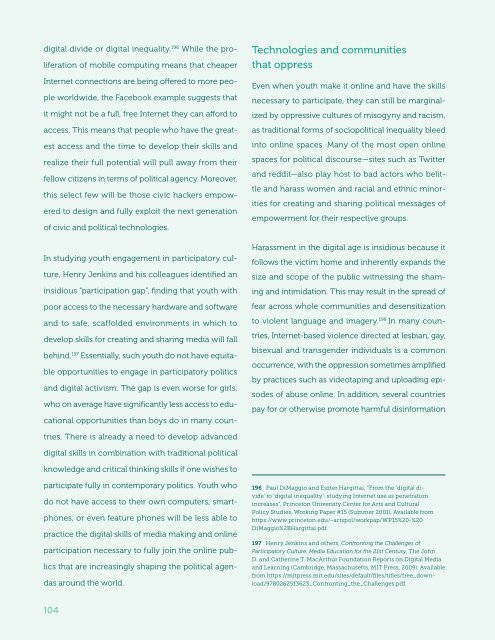YOUTH CIVIC
JieguI2U
JieguI2U
Create successful ePaper yourself
Turn your PDF publications into a flip-book with our unique Google optimized e-Paper software.
Technologies and communities<br />
that oppress<br />
Even when youth make it online and have the skills<br />
necessary to participate, they can still be marginalized<br />
by oppressive cultures of misogyny and racism,<br />
as traditional forms of sociopolitical inequality bleed<br />
into online spaces. Many of the most open online<br />
spaces for political discourse—sites such as Twitter<br />
and reddit—also play host to bad actors who belittle<br />
and harass women and racial and ethnic minorities<br />
for creating and sharing political messages of<br />
empowerment for their respective groups.<br />
Harassment in the digital age is insidious because it<br />
follows the victim home and inherently expands the<br />
size and scope of the public witnessing the shaming<br />
and intimidation. This may result in the spread of<br />
fear across whole communities and desensitization<br />
to violent language and imagery. 198 In many countries,<br />
Internet-based violence directed at lesbian, gay,<br />
bisexual and transgender individuals is a common<br />
occurrence, with the oppression sometimes amplified<br />
by practices such as videotaping and uploading episodes<br />
of abuse online. In addition, several countries<br />
pay for or otherwise promote harmful disinformation<br />
digital divide or digital inequality. 196 While the proliferation<br />
of mobile computing means that cheaper<br />
Internet connections are being offered to more people<br />
worldwide, the Facebook example suggests that<br />
it might not be a full, free Internet they can afford to<br />
access. This means that people who have the greatest<br />
access and the time to develop their skills and<br />
realize their full potential will pull away from their<br />
fellow citizens in terms of political agency. Moreover,<br />
this select few will be those civic hackers empowered<br />
to design and fully exploit the next generation<br />
of civic and political technologies.<br />
In studying youth engagement in participatory culture,<br />
Henry Jenkins and his colleagues identified an<br />
insidious “participation gap”, finding that youth with<br />
poor access to the necessary hardware and software<br />
and to safe, scaffolded environments in which to<br />
develop skills for creating and sharing media will fall<br />
behind. 197 Essentially, such youth do not have equitable<br />
opportunities to engage in participatory politics<br />
and digital activism. The gap is even worse for girls,<br />
who on average have significantly less access to educational<br />
opportunities than boys do in many countries.<br />
There is already a need to develop advanced<br />
digital skills in combination with traditional political<br />
knowledge and critical thinking skills if one wishes to<br />
participate fully in contemporary politics. Youth who<br />
do not have access to their own computers, smartphones,<br />
or even feature phones will be less able to<br />
practice the digital skills of media making and online<br />
participation necessary to fully join the online publics<br />
that are increasingly shaping the political agendas<br />
around the world.<br />
196 Paul DiMaggio and Eszter Hargittai, “From the ‘digital divide’<br />
to ‘digital inequality’: studying Internet use as penetration<br />
increases”, Princeton University Center for Arts and Cultural<br />
Policy Studies, Working Paper #15 (Summer 2001). Available from<br />
https://www.princeton.edu/~artspol/workpap/WP15%20-%20<br />
DiMaggio%2BHargittai.pdf.<br />
197 Henry Jenkins and others, Confronting the Challenges of<br />
Participatory Culture: Media Education for the 21st Century, The John<br />
D. and Catherine T. MacArthur Foundation Reports on Digital Media<br />
and Learning (Cambridge, Massachusetts, MIT Press, 2009). Available<br />
from https://mitpress.mit.edu/sites/default/files/titles/free_download/9780262513623_Confronting_the_Challenges.pdf.<br />
104


